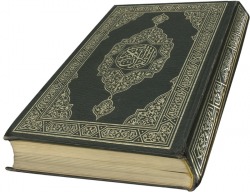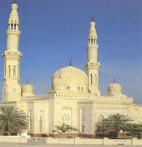What is Islam?
Islam (Arabic: الإسلام; al-'islām (help·info)) is a monotheistic Abrahamic religion originating with the teachings of Muhammad, a 7th century Arab religious and political figure. The word Islam means "submission", or the total surrender of oneself to God (Arabic: الله, Allāh).[1] An adherent of Islam is known as a Muslim, meaning "one who submits (to God)".[2][3] There are between 1 billion to 1.8 billion Muslims, making Islam the second-largest religion in the world after Christianity.[4]
Muslims believe that God revealed the Qur'an to Muhammad, God's final prophet, and regard the Qur'an and the Sunnah (words and deeds of Muhammad) as the fundamental sources of Islam.[5] They do not regard Muhammad as the founder of a new religion, but as the restorer of the original monotheistic faith of Abraham, Moses, Jesus, and other prophets. Islamic tradition holds that Jews and Christians distorted the revelations God gave to these prophets by either altering the text, introducing a false interpretation, or both.[6]
Islam includes many religious practices. Adherents are generally required to observe the Five Pillars of Islam, which are five duties that unite Muslims into a community.[7] In addition to the Five Pillars, Islamic law (sharia) has developed a tradition of rulings that touch on virtually all aspects of life and society. This tradition encompasses everything from practical matters like dietary laws and banking to warfare.[8]
Almost all Muslims belong to one of two major denominations, the Sunni and Shi'a. The schism developed in the late 7th century following disagreements over the religious and political leadership of the Muslim community. Roughly 85 percent of Muslims are Sunni and 15 percent are Shi'a. Islam is the predominant religion throughout the Middle East, as well as in parts of Africa and Asia. Large communities are also found in China, the Balkan Peninsula in Eastern Europe and Russia. There are also large Muslim immigrant communities in other parts of the world such as Western Europe. About 20% of Muslims live in Arab countries
Qur'an

Muslims consider the Qur'an to be the literal word of God; it is the central religious text of Islam.[24] Muslims believe that the verses of the Qur'an were revealed to Muhammad by God through the angel Gabriel on many occasions between 610 and his death on July 6, 632. The Qur'an was written down by Muhammad's companions (sahabah) while he was alive, although the prime method of transmission was orally. It was compiled in the time of Abu Bakr, the first caliph, and was standardized in the time of Uthman, the third caliph. The Qur'an in its actual form is generally considered by academic scholars to record the words spoken by Muhammad because the search for variants in Western academia has not yielded any differences of great significance and that historically controversy over the content of the Qur'an has never become a main point. [25]
The Qur'an is divided into 114 suras, or chapters, which combined, contain 6,236 āyāt, or verses. The chronologically earlier suras, revealed at Mecca, are primarily concerned with ethical and spiritual topics. The later Medinan suras mostly discuss social and moral issues relevant to the Muslim community.[26] The Qur'an is more concerned with moral guidance than legal instruction, and is considered the "sourcebook of Islamic principles and values".[27] Muslim jurists consult the hadith, or the written record of Muhammad's life, to both supplement the Qur'an and assist with its interpretation. The science of Qur'anic commentary and exegesis is known as tafsir.[28]
The word Qur'an means "recitation". When Muslims speak in the abstract about "the Qur'an", they usually mean the scripture as recited in Arabic rather than the printed work or any translation of it. To Muslims, the Qur'an is perfect only as revealed in the original Arabic; translations are necessarily deficient because of language differences, the fallibility of translators, and the impossibility of preserving the original's inspired style. Translations are therefore regarded only as commentaries on the Qur'an, or "interpretations of its meaning", not as the Qur'an itself.[29]
History
Islam's historical development resulted in major political, economic, and military effects inside and outside the Islamic world. Within a century of Muhammad's first recitations of the Qur'an, an Islamic empire stretched from the Atlantic Ocean in the west to Central Asia in the east. This new polity soon broke into civil war, and successor states fought each other and outside forces. However, Islam continued to spread into regions like Africa, the Indian subcontinent, and Southeast Asia. The Islamic civilization was one of the most advanced in the world during the Middle Ages, but was surpassed by Europe with the economic and military growth of the West. During the 18th and 19th centuries, Islamic dynasties such as the Ottomans and Mughals fell under the sway of European imperial powers. In the 20th century new religious and political movements and newfound wealth in the Islamic world led to both rebirth and conflict
Mosque

A mosque is a place of worship for Muslims, who often refer to it by its Arabic name, masjid. The word mosque in English refers to all types of buildings dedicated to Islamic worship, although there is a distinction in Arabic between the smaller, privately owned mosque and the larger, "collective" mosque (masjid jāmi`). Although the primary purpose of the mosque is to serve as a place of prayer, it is also important to the Muslim community as a place to meet and study. Modern mosques have evolved greatly from the early designs of the 7th century, and contain a variety of architectural elements such as minarets.
